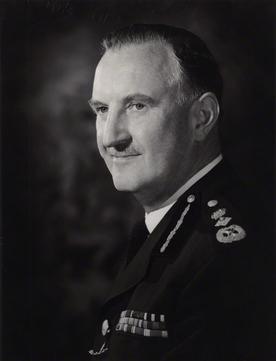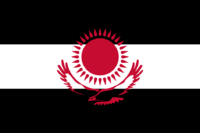Difference between revisions of "Caelan MacRory"
| Line 13: | Line 13: | ||
| caption = MacRoy in 1965 | | caption = MacRoy in 1965 | ||
| order = | | order = | ||
| − | | office = | + | | office = [[Ceannaire of Gjorka]] |
| status = | | status = | ||
| term_start = January 18, 1958 | | term_start = January 18, 1958 | ||
Revision as of 22:25, 1 March 2023
Caelan MacRory | |
|---|---|
 MacRoy in 1965 | |
| Ceannaire of Gjorka | |
| In office January 18, 1958 – August 13, 1971 | |
| Preceded by | Eli Mannion |
| Succeeded by | Austin Tannerburg |
| Personal details | |
| Born | August 14, 1900 Dundalk, Gjorka |
| Died | August 13, 1972 (aged 71) Gjorka City, Gjorka |
| Cause of death | Stroke |
| Spouse(s) |
|
| Profession | Military officer, Politician |
| Military service | |
| Allegiance | |
| Branch/service | |
| Years of service | 1919 (Revolutionary Army) 1919-1971 (Second Republic) |
| Rank | Private (Revolutionary Army) Supreme Marshal (Second Republic) |
Caelan MacRory (August 14, 1900 - August 13, 1971) was a the 4thPresident of Gjorka from 1958 to 1971 during the Second Gjorkan Republic. MacRory's tenure as President is considered one of repression. He backpedaled on many of the reforms implemented by his predecessor, Eli Mannion, instituted a national draft to help fight the resistance against his regime, and re-authorized the use of deadly force for police officers. His reign as President is seen as the biggest contributor to anti-regime sentiment that ultimately led to the Black Revolution.
MacRoy was born in Dundalk in 1900 to poor farmers just outside of the town. In 1919 during the Second Gjorkan Civil War, Revolutionaries managed to capture Dundalk. While MacRoy claimed he willingly joined the Revolutionary Army, testimonial from surviving soldiers and townspeople indicate he was abducted by the Army to serve in the war. MacRoy never saw combat during the war, but participated in supression attacks against remaining socialist groups in Éamon de Valera's "War Against Socialism". As he served in the Army, he steadily rose in the ranks, being known for his brutality towards Resistance members which impressed President Ciara de Valera who made MacRory General of the Special Forces in 1949. When Eli Mannion rose to power later that year, MacRory became a critic of his within government circles. Following Mannion's disastrous defeat against the Gjorkan Republican Army, allowing the group to briefly control Elkton, MacRoy formed a Junta of Anti-Mannion generals who succesfully pressured Mannion in resigning in 1958. The group quickly nominated MacRoy to be their leader, and he took power the same day.
Immediately upon becoming President, MacRoy reversed many of Mannion's reforms. MacRoy made all unions illegal, re-implement random searches of houses, and fired many of the bureaucrats he had appointed into the Army. However, MacRoy was unable to complete a full purge of the army given under Mannion the army had grown incredibly corrupt. Despite his attempts to crackdown heavily on resistance attacks, military officers were very easily bribed by the resistance to look the other way towards their activities. This corruption was never rooted out by MacRoy, and towards the later half of his tenure even increased, and was crucial reason for the revolutionaries success in the Gjorkan Resistance. As MacRoy aged he his grip on power. By 1965, many of generals were refusing to execute his orders due to their brutality, and were even acting against him. Ultimately it resulted in a soft coup, whereas by 1967 MacRoy was little more than a figurehead resigned to the Presidential Palace, while his Generals established warlord like cliques over the country. In 1971, MacRoy died of a stroke at the age of 71. His death resulted in political turmoil, including a coup, that resulted in the overthrow of the dictatorship in the Black Revolution.
